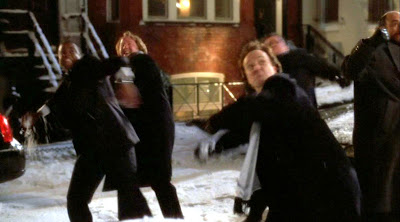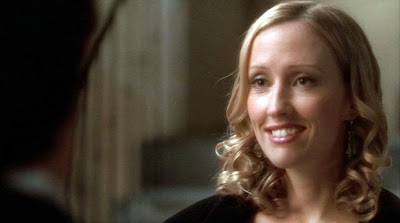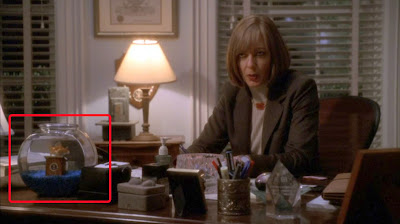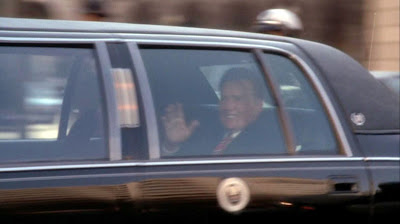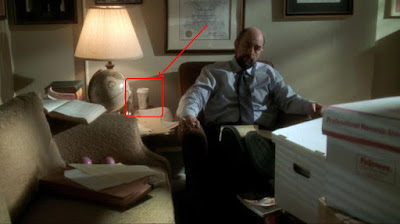Original airdate: February 12, 2003
Teleplay by: Aaron Sorkin (77)
Story by: David Gerken (2) & Gene Sperling (3)
Directed by: Lesli Linka Glatter (2)
Synopsis
- A Laurel and Hardy movie apparently pushes President Bartlet to go ahead with a massive change to US foreign policy in his inaugural address. Donna admits to a damaging leak to the press, but it's not exactly as it seems. Will is hired as Toby's deputy.
There were plenty of loose ends dangling all over the place at the end of the previous episode. What was this big change in the inaugural address that had all these legislators worried? Is Will going to get the boot from the White House after speaking frankly to the President? Why was Donna in trouble, and will she be pissed at Josh forever? We get those all tied up pretty neatly in the wrapup of this two-parter, although I'm still scratching my head about how Aaron Sorkin thought a clip of a Laurel and Hardy movie would somehow be enough for the audience to figure out how the President made up his mind ...
The big picture, of course, is the Bartlet Doctrine. The previous episode set up the situation: ethnic cleansing/genocide was taking place in the African nation of Equatorial Kundu, and while the world was horrified with the mounting death toll, nobody seemed to think there was really anything that could be done about it. Will, working on the inaugural speech, found a quote from Bartlet as a congressman 16 years ago that asserted an American responsibility to protect human rights anywhere in the world, and he pushed to try to include that language in the address - but, as Toby tells him right off the bat in this episode, that's not what we are able to do:
Will: "Well, I finished the language."
Toby: "How is it?"
Will: "Bloodless, compromising, and half a loaf."
Toby has been using his Spaldeen rubber ball to call Will over to his office, bouncing it against the glass between them to get his attention, which causes Will to ask:Toby: "That's foreign policy."
Will: "You're not ever worried about the window breaking?"
Will, though, finding his efforts to get a real moral and humanitarian change into the speech thwarted, might actually be even more frustrated than Toby. As he goes back to his office after Josh and Toby shoot him down again, we hear this:Toby: "During moments of peak frustration. When the Speaker of the House threatens to repeal the 16th Amendment. A couple of Yankee games. And there was the time Congress censured my boss. But it's always held up, that window. That window's a game-day player."
Josh: "What's his level of frustration?"
Toby: "It's high."
Followed by Will's attempt to bounce something off that same glass window:
Will: "Sorry."
We actually get some really good conversations among the staff about this issue. Prior to the window-shattering frustration above, Josh actually agrees with Will about doing something on moral grounds, but tells him the political reality won't allow it. When Josh, Toby, and CJ get out of the White House for a few minutes to have drinks at a club, CJ and Toby have a real debate about it, too:
Toby: "On Sunday, he's taking an oath to ensure domestic tranquility."
CJ: "And to establish justice and promote the general welfare. Stand by while atrocities are taking place, and you're an accomplice."
Toby: "I'm not indifferent to that, but knuckleheaded self-destruction is never going to burn itself out, you really want to send your kids across the street into the fire?"
CJ: "Want to? No. Should I? Yes."
Toby: "Why? And don't give me a lefty answer."
CJ: "A lefty answer is all I've got."
Toby: "Why are you sending your kids across the street?"
(long pause)
CJ: "'Cause those are somebody's kids, too."
The President is not indifferent to the situation, either. As Toby tells Will, "This haunts him." And as he sits in his study late at night, flipping on the televisions to catch up on the news, something he sees on those screens flips a switch in his brain.
The juxtaposition of American soldiers on the news and wooden toy soldiers marching in a Laurel and Hardy movie somehow, someway make all the difference to the President. While he's been mulling over Will's comment from the previous episode for days (President: "Why is a Kundunese life worth less to me than an American life?" Will: "I don't know, sir, but it is"), this is finally the thing that turns the tide, that makes the decision. Bartlet reaches for the phone, and the staff is called in for a meeting.
The President's little speech to the staffers is incredibly well-written, meaningful and strong. As I watched it I was thinking that Will and Toby better be taking notes, because Bartlet is writing this section of the inaugural address for them:
President: "We're for freedom of speech everywhere. We're for freedom to worship everywhere. We're for freedom to learn ... for everybody. And because, in our time, you can build a bomb in your country and bring it to my country, what goes on in your country is very much my business. And so we are for freedom from tyranny everywhere, whether in the guise of political oppression, Toby, or economic slavery, Josh, or religious fanaticism, CJ. That most fundamental idea cannot be met merely with our support. It has to be met with our strength. Diplomatically, economically, materially. And if Pharoah still don't free the slaves, then he gets the plagues, or my cavalry, whichever gets there first."
In a really nice moment, as the President says he wants to get this into his speech at the inauguration, whether or not the staffers actually agree with him, all four of those guys immediately turn to each other to get to work, to make the changes, to build the strategy and make sure it's done in the best possible way - right in the middle of a Presidential directive:
Which leads to quite a look of immense pride and humorous satisfaction from Bartlet, seeing his loyal staff take the ball and start running with it instantly:
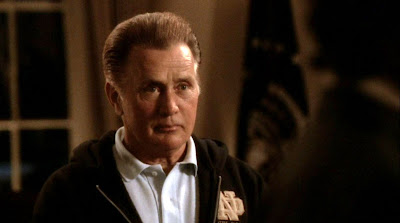 |
| "Do I just keep standing here?" |
So that becomes the Bartlet Doctrine, and as we find out later during the Inaugural Ball, he's already set to put it into action and order troops into Kundu to stop the killings and the genocide.
President: "Actually, I meant I wish he could be here now when I tell you Toby's asked me to commission you as his deputy."
Will: "I'm sorry, sir?"
President: "Toby wants to make you deputy."
Will: "Pardon me?"
President: "I'm appointing you Deputy Communications Director. It covers a wide range of areas of policy and execution and counsel to me."
Will: "To you ... the President?"
President: "Yes."
Will: "I'm sorry, sir, I'm not following. Are you ...?"
Will eventually fights through the buzzing in his ears and accepts the call to join the team.
You see Donna in that picture above. In the previous episode, she was upset about her boyfriend Jack Reese, a Navy officer assigned to Nancy McNally in the White House, getting sudden orders to ship out to Italy because of something he'd done at the request of someone high up in the administration. She was really (justifiably) angry with Josh when he had the rude audacity to suggest maybe Jack had asked for the transfer to get away from her. We also heard she hadn't shown up at the inaugural events and wouldn't return Josh's calls.
As the President is laying out his new vision for foreign policy to his staff, CJ is dealing with an embarrassing press leak. Danny Concannon was writing a story about tensions between the Defense Department and the President, and when he asked CJ for a White House contact to fill in some background details, she offered Donna's name. When the story hit the newspaper, an unnamed "White House aide" was quoted:
Josh: "What was the quote?"
CJ: "Everyone's very loyal to everyone else around here, unless you wear a uniform."
Instantly suspicion falls on Donna - she was already upset about Jack's reassignment, she was the contact CJ gave to Danny, everything fits. When Donna calls CJ to admit she was the source, that makes things pretty open-and-shut ... which nearly sends Josh off the deep end, for her using a personal slight to attack the President personally.
At least until Josh gets a look at the actual story. Turns out there's more to the quote, a bit about not getting a $10 billion appropriation the Pentagon wanted ... and Josh knows Donna had no knowledge about that. He realizes she gave herself up to CJ in an effort to protect Jack, who was the real source of the quote trying to hit back at the President on his way out the door.
This brings us to a snowy street outside Donna's apartment, as a cab full of exuberant men (Josh, Toby, Will, Charlie, and, for some reason, Danny) yell and throw snowballs at her window.
When she finally appears (in her ballgown, hair done up fancy and everything), Josh first offers up his coat, since it's really cold and she came out without one. As he begins to take her to task for her clumsy effort to cover for Jack, those inner feelings begin to finally seep through:
Josh: "Your career isn't important? What was the point of anyone claiming ... (light bulb comes on) You knew it was easy, to figure out it was him."
Donna: "Not as easy as you made it. I didn't think about the top of the quote -"
Josh: "The list of things you didn't think about, including your job, what the President thinks of you ..."
Donna: "Does he know about this?"
Josh: "He's about to. (looking at Donna, taking her in, realizing something) You look amazing."
And Donna ... well, she simply lights up at that.
The relationship between these two is complicated, and that's putting it mildly. Janel Moloney has said right from the outset of the series she decided to play Donna as deeply in love with Josh, not as anything really outwardly said or done, but just as subtext - and since she and Bradley Whitford have an undeniable chemistry together, that started to come through a little in the writing. But Josh is Josh, like we saw last week, easily able to go from caring to cruel in the course of the same sentence, and you wonder how much Donna is going to be able to put up with. It really is one of the great, series-long story arcs that is going to have a lot of ups and downs, but (at least in my opinion) pays off pretty well at the end.
This wraps up the tension and drama of Bartlet's Second Inaugural, and the decision to change American foreign policy to intervene militarily for humanitarian purposes. It does not, however, end the story of the administration's involvement in Kundu, or overseas in general. But first, we have to say goodbye to Sam Seaborn - that's coming up next.
Tales Of Interest!
- I was pretty hard on Sorkin and the writers for the last few episodes, but upon rewatching I think this one is a bit better. Part of that, of course, is the fact that it actually wraps up a bunch of loose ends from Inauguration: Part I, so it's going to be more satisfying, but even so it's quite a bit better structured. I still don't thinkthe upcoming California 47th is very well put-together, and there are still some gaping plot holes here (I mean, how exactly does marching wooden soldiers in Babes In Toyland inspire Bartlet to pull the trigger on his radical new doctrine?), but there's some pretty good stuff. I'm holding out for the end-of-season arc, which not only is gripping and entertaining, it's a real "screw you" from the departing Sorkin to the oncoming showrunners.
- Also mentioned previously, while Equatorial Kundu's location was never specifically defined when it was first referred to in In This White House, we know that President Nimbala's wife fled to Kenya to escape a coup. That would place the nation somewhere in west-central or central Africa. In Inauguration: Part I Leo says it's near the Ivory Coast - and there's a quick glimpse of a TV screen with a star apparently placing Kundu on the Atlantic coastline of Africa.
- Gail's fishbowl features a presidential podium, fitting for the topic of the inaugural address.
Quotes
Danny: "This isn't about Shareef."
CJ: "Okay, then what?"
Danny: "It's a little about Shareef."
CJ: "Good day to you, sir."
Danny: "CJ ..."
CJ: "I said, good day, sir."
Danny: "Get in there, would you?"
CJ: "Nobody takes me seriously when I say, 'good day, sir.'"
Jed: "Abbey, the kids are eating sugar."
Abbey (awakening): "Oh."
Jed: "How you doing? You know I gave the kids candy all the time, right?"
Abbey: "Behind my back?"
Jed: "Yes."
Abbey: "You bought their love."
Jed: "Well, it was for sale, and I wanted it."
Toby: "I suppose you can't blame Will completely."
Will (enters): "Hi."
Toby: "This is entirely your fault."
-----
President: "No country has ever had a doctrine of intervention when only humanitarian interests were at stake. That streak's going to end Sunday at noon."
-----
CJ: "So you think the Chief Justice has lost his mind?"
Toby: "I didn't say he's, 'lost his mind,' I said ... I said he's lost his mind and Leo said he's lost his mind."
CJ: "Leo's lost his mind."
Toby: "Speaking in verse -"
CJ: "A literary curse."
-----
Josh (outside Donna's apartment): "It's good cop, bad cop. I'm the good cop, the four of you are the bad cop. Will, what are you?"
Will: "The bad cop."
Josh: "Danny, what are you?"
Danny: "The bad cop."
Josh: "Toby, what are you?"
Toby: "Hurry up."
Josh: "Charlie, who are you?"
Charlie: "I love Zoey, and I must have her back."
Josh: "The bad cop, that's right. Here we go."
Story threads, callbacks, and familiar faces (Hey, it's that guy!)
- The singer in the club CJ, Toby, and Josh go to is Jill Sobule. She performs her songs Heroes and Rock Me To Sleep.
- Toby's rubber ball and his bouncing it in the office has been seen as far back as Ellie, was a famous part of the incredible 17 People, and later was occasionally used to summon Sam. I don't remember specifically seeing Toby use it during the congressional censure events of H. CON-172.
- Will confronts Toby about his convincing the President to rewrite a section of his second State of the Union address at the last minute. We saw that in He Shall, From Time To Time ...
- Danny's locating of the family of Shareef's pilot and his source telling him about the President rescinding executive orders on assassinations takes us back to Posse Comitatus. In that episode, Leo tells the Gang of Eight, "The President's rescinding his own Executive Order," which is specifically referred to as 11905 (one of the orders mentioned by Danny here). That is an actual Presidential executive order that, among other things, bans political assassinations, which was signed by President Gerald Ford in 1976 (so it's not Bartlet's own order). That quote does seem to fly in the face of what Leo tells the President in this episode, that it was a National Security Directive and not technically the recission of an executive order (he said it was that himself in the basement meeting with the Gang of Eight!).
- I'm not sure when this happened, but Toby is no longer wearing a wedding band. When the series started and Richard Schiff was cast in the role, he decided on his own that Toby had been previously married, so he wore a wedding band. Several episodes in, when Sorkin was plotting out some background for his characters, he noticed Schiff had forced his hand, sort of, by having Toby wear that ring (in his character background, Schiff actually worked up a backstory that Toby was a widower, which would help explain why he was often morose). Sorkin then worked up the divorced-from-a-congresswoman backstory that was introduced in Mandatory Minimums. Anyway, we know much more about Toby and Andy now (including the fact that they are expecting twins and that Toby wants to remarry and Andy does not) ... but at some point along the way Toby's wedding band has disappeared from his finger.
- The fictional TV news network CND logo appears again, as the President watches some late-night news coverage. I really have no idea what "CND" is supposed to stand for, or at least what the "D" means (I assume it's "Cable News" ... something).
- This is the first time I've noticed this little sign on the President's desk. It actually remains there prominently through the rest of the series - perhaps it was there previously, but I've never spotted it until now. It reads, "O God, thy sea is so great, and my boat is so small." Commonly called the Breton Fisherman's Prayer, a plaque like this was given to President John F. Kennedy by Admiral Hyman Rickover, and Kennedy displayed that plaque on his desk.
- Leo says divers looking for a lost helicopter in the Atlantic off Bermuda might find a piece of a Gulfstream (a reference to the dismantling of the pieces of Shareef's plane after his assassination in Posse Comitatus). However, the shots of Shareef's plane that we saw in that episode clearly indicate it was a Learjet and not a Gulfstream.
- Danny, as he's explaining why he carries a copy of his latest Washington Post article with him, says Josh made a big deal about his Fulbright Scholarship. We heard about the scholarship from Mandy (remember her?) all the way back in Pilot, and Josh also brought it up to Mrs. Landingham in Mr. Willis Of Ohio.
- Charlie's proclamation of love for Zoey, and his promise to win her back from Jean-Paul, is a long story arc (Charlie and Zoey first met in The Crackpots And These Women, their relationship led to the shootings seen in What Kind Of Day Has It Been/In The Shadow Of Two Gunmen, and ended sometime after The Midterms, with Jean-Paul first appearing in Holy Night).
DC location shots
- The shots of the motorcade traveling through Washington were shot on location (we see a signpost for the 1100 block of Pennsylvania Avenue). By peeking through the windows as Jed and Abbey talk in the car, it appears they filmed that scene with the limousine driving on Constitution Avenue, along the National Mall.
- Here's a Google Street View of the corner with that Pennsylvania Avenue street sign, and the blue directional sign that's seen below it. It's the corner of Pennsylvania Avenue and 12th Street NW, with the Trump Hotel on the left side of the picture (at the time of this episode, that was the Old Post Office building) and the building that houses the EPA on the right.
- The underground parking garage the motorcade pulls into - supposedly at the Capitol - is actually located under the Ronald Reagan Building and International Trade Center (there's a sign on the wall welcoming people to the building - although partially hidden by a conveniently placed Secret Service agent and a policeman, you can make it out).
They Do Exist! It's The Real Person, or Thing
- Will tells Toby, "I figure if we're not going to help create freedom from tyranny, then let's at least sell some Barcaloungers."
- The Convention on the Prevention and Punishment of the Crime of Genocide was adopted by the United Nations in 1948.
- The continuing story of which Bible the President will use to swear his oath of office on continues, with another mention of George Washington's inaugural Bible.
- When Danny brings up the conflict between the Secretary of Defense and the White House, he compares that to the Jets and the Sharks (the rival gangs in West Side Story).
- Executive Orders 11905 and 12333 are real; 11905 (signed by President Ford in 1976) does ban political assassinations, while 12333 (signed by President Reagan in 1981) focused on the powers and responsibilities of intelligence agencies.
- The Iota Club & Cafe was a trendy club in Arlington. It closed in the fall of 2017.
- The President is wearing a Notre Dame hoodie. Martin Sheen said he wouldn't take the role of President Bartlet unless the character was a Catholic and a graduate of Notre Dame.
- Abbey fell asleep reading the novel A Thousand Pieces Of Gold, by Ruthanne Lum McCunn, published in 1981.
- When the President switches on TV as a distraction, he comes across a recording of an old Laurel and Hardy movie somebody's (Tony's? Donnie's? And who is this person?) grandchildren were watching (Babes In Toyland).
- The President quotes Frederick the Great ("to defend everything is to defend nothing").
- As the President channel-surfs late at night, we see the famous TV pitchman Ron Popeil.
- Will is apparently staying at a Holiday Inn with a view of the Capitol dome. I'm not exactly sure where this is ... at this time the Holiday Inn nearest the Capitol is at 550 C Street SW, just south of the Air and Space Museum. I don't know if you can get a shot like this from there or not, but maybe. Or perhaps there was a different Holiday Inn location in 2003.
- As CJ rips into Danny about giving up the name of his researcher she says she wants to give him a Lexus.
- When Charlie says as a show of love for Zoey "I'd take off my shirt, too, but it's inappropriate with a tuxedo," Danny replies, "Not if we're at Chippendales."
- Toby pretends to call the National Enquirer when Donna's neighbors complain about all the noise and the snowball throwing.
- Fox (meaning Fox News) gets mentioned by the President as being critical of his new doctrine.
- Toby again has his Starbucks cup in his office.
- Will, on the other hand, has a Dunkin Donuts cup on his desk (as a neat callback to Will's coffee preference, we saw a staffer bringing in Dunkin Donuts items to his campaign office in Election Night).







